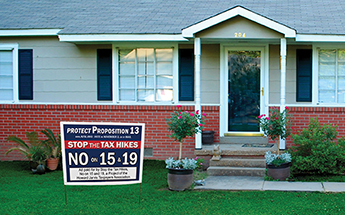MAKES THE NOVEMBER BALLOT: NO ON 15

The long-expected attack on Proposition 13 will be Proposition 15 on California’s statewide ballot in the November 3 election.
Proposition 15 would revoke Proposition 13’s protection from business properties, effectively raising taxes on nearly every business in California, not just once, but over and over again.
California has always taxed all property under the same rates and rules, a practice that goes back to the 1800s. Proposition 15 would, for the first time in California history, “split the roll,” dividing the county assessors’ list of taxable properties into different categories based on how the properties are used and how much they are worth, then taxing them differently.
Under Proposition 15, commercial and industrial properties would be reassessed to current market value every three years.
Because 1978’s Proposition 13 limits annual increases in the assessed value of any property to no more than 2 percent until there is a change in ownership, the owners of long-held business properties who lose Proposition 13 will see massive tax increases when their properties are reassessed.
What business properties would be affected? Supermarkets, shopping malls, office buildings, movie theaters, sports arenas and stadiums, car washes, car dealerships and auto repair facilities, warehouses, factories and distribution centers, film and television production facilities, theme parks, convention centers, hotels and restaurants, hair salons, nail salons, gyms, yoga studios, dry cleaners, shoe repair shops, hardware stores and electronics retailers, every Target, Walmart and Costco — nearly every business where Californians are employees or customers.
Residential property and agricultural land are exempted, but buildings on agricultural land such as processing facilities would be subject to reassessment.
Although the initiative appears to exempt small businesses, this is an illusion. Business owners who own the building in which their business operates may qualify for an exemption if the property is valued at $3 million or less, but small businesses that lease their space from larger businesses will likely see sharp increases in their rent. For businesses that have “triple net” leases, which require the tenant to pay the owner’s cost of insurance, maintenance and property taxes, the higher property taxes will be billed to the small business owner. These higher operating costs are typically passed through to customers in the price of products and services.
Proposition 15 would mean higher prices across California’s economy and could accelerate job losses as higher taxes put more financial pressure on employers already struggling to keep their workers on the payroll. A massive tax increase on nearly every business in the state risks delaying or even preventing an economic recovery in California, while other states thrive.
In a highly unusual move, the California Assessors Association has taken an official position against Proposition 15.
The assessors said provisions in the initiative intended to exempt small business properties from reassessment would require complex research to determine whether any of the owners are actually bigger businesses. That’s because there’s no exemption for small business properties if one of the owners also owns other business properties with a combined value above the $3 million threshold.
Another complicated provision would delay reassessment for several years for properties occupied by a sufficient percentage of small-business tenants, as defined by the number of employees and other factors.
The initiative would be “impossible” to implement as written, the assessors told state lawmakers in a letter. They said the measure would cost $1 billion in the first three years, without counting the cost of higher salaries to recruit and retain experienced commercial property assessors needed to handle the new workload. Related departments, such as the offices of the county treasurer–tax collectors, would also incur higher costs.
The proponents of Proposition 15, operating under the banner, “Schools and Communities First,” say the initiative would collect $12 billion per year to be divided up between local governments and school districts.
In fact, no one knows how much the split-roll property tax would collect. Property values in the commercial market have been rocked by the months-long COVID-19 lockdown. Shopping malls, office buildings, restaurants and hotels, for example, may now be worth far less than the proponents calculated.
That only increases the likelihood that Proposition 15 is “step one” in a long-term plan to raise taxes by destroying Proposition 13 completely, revoking it from one group of property owners after another, until homeowners are once again at risk of being taxed out of their own homes.
Proposition 15 would be a disaster for California. Defeating it is a top priority.
Ready to help? Click Support the campaign to protect Prop. 13. There you can request a free yard sign, download a flyer, sign up to volunteer on the campaign or donate online. Or call us at 916-444-9950 or 213-384-9656.
Ad paid for by Protect Prop. 13, No on 15, a Project of the Howard Jarvis Taxpayers Association
HJTA.org is your source for everything Proposition 13 and for information valuable to California taxpayers. For more information or to take action, go to HJTA.org/take-action.
Published by the Howard Jarvis Taxpayers Association (HJTA). Copyright © 2020 by Howard Jarvis Taxpayers Association. All rights reserved.

